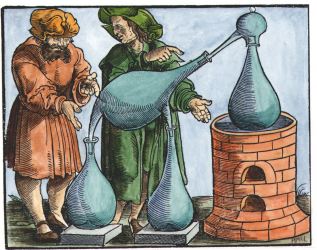| Author | Post |
|---|
Carl Lavoie
Member
| Joined: | Wed Feb 25th, 2009 |
| Location: | Canada |
| Posts: | 215 |
| Status: |
Offline
|
|
Posted: Sun Dec 26th, 2010 09:22 pm |
|
.
Whenever Pagel, Dubus and others allude to the celebrated ‘willow experiment’ of Jean-Baptiste Van Helmont, described in his posthumous Ortus Medicinæ (Amsterdam, 1648; here below in the 1652 edition, p. 88), they never fail to mention that the idea came from Nicolas de Cusa. Dubus makes it sound as if it didn’t only come first, but that it was actually the inspiration for Van Helmont’s experiment.
But I haven’t yet read Van Helmont giving credit de Cusa for the suggestion of the plant-weight experiment. Does Van Helmont really owe him the idea? Does he admit his debt somewhere (in a diary, in a correspondence), or is it an inference from the modern authors?
http://books.google.com/books?id=uLubZKrl62QC&pg=PT305&dq=ortus+medicinae&hl=en&ei=06UXTb_KNcGs8Ab-gY3HDQ&sa=X&oi=book_result&ct=result&resnum=1&ved=0CCMQ6AEwAA#v=onepage&q=arbor&f=false
And :
http://www.jstor.org/pss/4449369
|
Paul Ferguson
Member

| Joined: | Fri Feb 15th, 2008 |
| Location: | |
| Posts: | 1538 |
| Status: |
Offline
|
|
Posted: Tue Dec 28th, 2010 09:59 am |
|
I assume it is an inference by modern authors.
Book IV of Cusa's 'Idiot' which contains the willow tree 'thought experiment' and also one to measure the specific gravity of urine, which Van Helmont also performed, was re-published, for some extraordinary reason, as part of Vitruvius in 1534:
Vitruvius, Pollio. De architectura libri decem. Item ex libro Nicolai Cusani Card. De staticis experiraentis, fragmentum. Argentorati: in officina Knoblochiana per Georgium Machaeropioeum, 1534.
It is possible that both Van Helmont and Robert Boyle were aware of this re-publication.
The willow tree experiment is also mentioned in the pseudo-Clementinos, which Van Helmont may also have had direct knowledge of:
http://books.google.com/books?id=m0cQQlZK43cC&pg=PA80&lpg=PA80&dq=cusanus+willow+urine&source=bl&ots=RGgLvxlcpg&sig=Y8H5r1I3XSQzxXVbjU4klcmp7Y8&hl=en&ei=NrMZTbnZE4aWhQfLkbmVCg&sa=X&oi=book_result&ct=result&resnum=1&ved=0CBcQ6AEwAA#v=onepage&q=cusanus%20willow%20urine&f=falseLast edited on Tue Dec 28th, 2010 12:05 pm by Paul Ferguson
|
Carl Lavoie
Member
| Joined: | Wed Feb 25th, 2009 |
| Location: | Canada |
| Posts: | 215 |
| Status: |
Offline
|
|
Posted: Tue Dec 28th, 2010 05:19 pm |
|
.
That’s a bit what I suspected, that there is no direct lineage (I mean, until we find a formal link between the two).
Still, I was rather amused when reading a translation of “On the Origin” (1459), Cusanus used that quote of the Apostle…
[…] Rather, that one gives increase, who has also given being, namely God. Thus Paul says in I Cor 3 : “Neither the one who plants nor the one who waters is anything, but only God, who causes the growth.”
- Nicolaus of Cusa, Toward a New Council of Florence, ‘On the Peace of Faith’ and Other Works, Washington D.C., 1993, p.342.
.
|

Current time is 09:38 am | |
|
|
|

